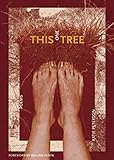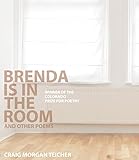Rebecca Keith holds an MFA in poetry from Sarah Lawrence College. She has received honors from the Atlantic Monthly and BOMB Magazine and was a finalist for the 2008 Laurel Review/GreenTower Press Midwest Chapbook Series Award. Her work has appeared most recently in The Laurel Review and Storyscape Journal. She is a founder and curator of Mixer reading series in New York City and she sings and plays guitar with the bands New York Times and The Roulettes.
Lines of poetry by Rebecca: “Earth to Love, Earth to Love/ I don’t think that suitcase/is big enough. Do you read me?”
We walk down a hall on a slight incline (which my friend imagines was once a sluice for molten chocolate), climb a short flight of metal stairs and enter a long, narrow rectangle of a room, with a square window at one end, white brick walls, and concrete floors painted varying shades of gray. We’re at a dance performance, “Discrete Body Dilemma,” by the company MayDance, at the Chocolate Factory (yes, an abandoned chocolate factory) in Long Island City, Queens. Seats are arranged in two long rows against opposite walls, facing each other. Audience members are told to look carefully at the person across the aisle from them before the show begins. We will trade seats with this person, all part of the choreography. As the lights go down, slowly, we traverse the room, do-si-do-ing past our opposite. On the way across the room, in measured steps, I pass the choreographer’s parents in the dark. I am in an entirely different room from the one I first entered. Sitting down, across from where I was, I’m in yet another room, a new place, facing east now I believe (the Empire State Building was visible outside, within touching distance, seen from the opposite direction). We reorient ourselves, shift into our seats as the dancers move, in two lines, led in a chant by two composers. During the performance, the dancers break into solos or pairs on opposite ends of the space – in unison, in canon, other times haphazard. The two musicians intone, twiddle, loop.
A woman on the subway and I caught each other’s eye the other morning, after the automated conductor told us, “Please be aware of your surroundings at all times.” She said she was reading about Buddhism and science, that maybe at their core they’re both about looking at reality, just different slices of reality. At the MayDance performance, each place I look is a different room; it is hard to choose one point of focus, and the seats are too close to the stage to take in everything at once. The dancers create spaces – pushing a chest away with a hand, cradling a face in the nook of an elbow.

 A couple poets I’ve been reading lately have that same (sought after) ability to transform each page, stanza or line, into a new space. It is much like the way Bishop takes you in and out of the waiting room, or creates vast rooms with her “Pleasure Seas,” where “love/ sets out determinedly in a straight line,” or rooms of absence, constructed by time and “Distance: Remember all that land/ beneath the plane” (from “Argument”) or her “Varick Street,” where all the factories, the action on different floors, are reduced to how “Our bed/ shrinks from the soot/ and hapless odors/ hold us close” or the minute detail of “O Breath” – breath flowing through chambers of a heart that lives beneath a breast. Bishop’s speaker can get close, but not quite form a union with this other: “within if never with.” Craig Teicher and Katie Peterson’s work locates you in a more subtle way, as if you are reaching, like Mr. Ramsay in To the Lighthouse, “stumbling along a passage one dark morning,” stretching your arms out for someone. They relocate you, with a line, a word, as fast as your whole situation might change with one word, look, gesture. These shifts are at the heart of their two books, Teicher’s Brenda is in the Room and Peterson’s This One Tree – Craig’s many rooms and views of the same room, Katie’s trees, also seen from changing perspectives. Both poets’ speakers, out of chaos, seek to create order, however tenuous or transparent.
A couple poets I’ve been reading lately have that same (sought after) ability to transform each page, stanza or line, into a new space. It is much like the way Bishop takes you in and out of the waiting room, or creates vast rooms with her “Pleasure Seas,” where “love/ sets out determinedly in a straight line,” or rooms of absence, constructed by time and “Distance: Remember all that land/ beneath the plane” (from “Argument”) or her “Varick Street,” where all the factories, the action on different floors, are reduced to how “Our bed/ shrinks from the soot/ and hapless odors/ hold us close” or the minute detail of “O Breath” – breath flowing through chambers of a heart that lives beneath a breast. Bishop’s speaker can get close, but not quite form a union with this other: “within if never with.” Craig Teicher and Katie Peterson’s work locates you in a more subtle way, as if you are reaching, like Mr. Ramsay in To the Lighthouse, “stumbling along a passage one dark morning,” stretching your arms out for someone. They relocate you, with a line, a word, as fast as your whole situation might change with one word, look, gesture. These shifts are at the heart of their two books, Teicher’s Brenda is in the Room and Peterson’s This One Tree – Craig’s many rooms and views of the same room, Katie’s trees, also seen from changing perspectives. Both poets’ speakers, out of chaos, seek to create order, however tenuous or transparent.
What is a room? A place that contains, finite space, set, defined by walls. A door releases or locks in, window shows the other – view out, view in. Sound comes in waves, creates pockets, alcoves. How much control do you have over the spaces you wind up in? Do you choose to put yourself there? When a shift of someone else’s body transforms the whole architecture of the room, is there something you could have done to alter the outcome? Can you change it back?
Craig Teicher writes, in his book’s title poem, “Brenda is in the Room,” “In many ways, two people are larger/ than the rooms – including/those with four walls, and those/ that are figured on paper – that they occupy. To portray them/ factually, an author (architect or/ writer) must construct rooms/ that admit the necessity for still more/ rooms.” As Teicher’s speaker and Brenda move in and out of the rooms, crossing each other, sitting quietly together but working separately, leaving each other for other rooms and coming back into one, they stretch their union, test its elasticity. Teicher defines “marriage” and “union” early on in the poem, an investigation that yields no firm answer, an ever fluid definition. He writes, “Two people pass through the ceremonial/ threshold of marriage and enter/ a room together. It is a new room/ or, defying physics through ceremony,/ the same room they left, though different.” It is his speaker’s own “Discrete Body Dilemma” – dancing with one other body through a lifetime. Both will pass close to many other bodies, trying not to cross the threshold that would defy their union. In another section of the poem (these section self-described as, of course, “also like rooms”), Teicher writes of the apartment his speaker and Brenda share: “We will cross/its many thresholds as ever, in one way/ occupying just one room at a time, and/ in another, occupying many rooms.” Echoing Bishop’s, “within if never with,” Teicher’s speaker and Brenda fill the rooms of their home, expanding and collapsing their space together – five rooms, sometimes concentric, occupied each moment by different breaths, layer upon layer of shared dwelling. In the poem’s second stanza, Teicher writes, “A good room/is a fortress, a projection of/ the mind of its occupant(s).” I imagine the occupants of his poem’s rooms projecting directly into each other’s minds, their imaginations adjoining suites, creating art on every wall and surface, closing doors for moments of rest.
Katie Peterson’s This One Tree contains six central poems called “The Tree.” In the second of these, her speaker looks upon the remnants of a tree house in an evergreen. Peterson writes, “Why take down what might be/ useable, one parent said. The other/ said nothing. Still we never climbed,/ or never built… When we played we played around it.” The speaker moves in and out of focus from childhood to the present, from feet, footprints, and home on the ground to what was intended as a home above but was reduced to just wood, wet and ruined. Other trees in the section regenerate with the change of seasons, “a narrative that darkens,” but the wood cut for the house stays in permanent winter. In the sixth “The Tree”, Peterson writes of a Japanese maple, “Nights stopping here, there was/ no need to choose, you were/ what home was, you were/ my lexicon of belonging, my/ own location. Though I regretted/ all I never once regretted you.” The poet’s lexicon is, of course, how she belongs, where she lives – in rooms built of words or under the “orderly” leaves of a well-groomed tree. “What I want,” Peterson writes, “is to have chosen/ already what to do,” but her speaker wanders from tree to tree in these poems, at once looking back at homes, or loves, and looking for a new one. In “Aubade of the Tree,” two trees together “make an arch some story must explain,” their long bodies leaning and “hooked… around each other,” as the MayDance dancers created spaces with each other’s bodies, and Teicher’s speaker and Brenda build and rebuild the rooms they occupy. Peterson writes, “No window frames these branches alone/But takes in everything, takes this one tree in…/ As if in responsibility, as if in thoughtfulness/ Which no house truly holds/ Except the house where someone stays awake.” As if her speaker, staying awake long enough, looking through a wide enough lens, could live all the lives she wants – one on the ground and one in the tree house, one under Japanese maple and one under sycamore. As if she could rebuild the original structure or protect the tree house before decay, as if all could “stay green and equal, some seasonless intent/ at odds with calendar.” But more realistic, she will frame and reframe the same life from different vantage points, twisting between bodies and leaves, fitting together into new spaces and constantly looking back on the old.








